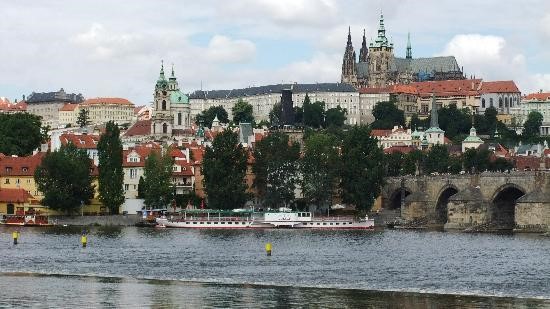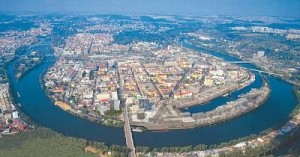
The laboratory where we worked in Prague during the 1970s was in the basement of a several hundred years old apartment house. Four or five of us worked in a two hundred square foot room that was pleasantly cool in the summer but frigid in the winter. A scintillation counter and spectrophotometer (something you might find in a high school nowadays) were only available in a lab on the other side of the city, so many days my husband would have to jiggle across the city on a variety of trams with a box of vials for counting. For part of the year, there was no water and we had to walk up the hill from the lab to get water from an outside spigot. Laboratory supplies such as magic markers and glass coverslips were jealously guarded; they were not available locally and were mostly gifts from visitors or brought back by those scientists who were allowed out of the country. Our mail came to the lab, and once, when we had received no mail for nearly a month, we phoned the Consulate to complain it was being held up. We were told there was really nothing the Consulate could do without a lot of back channel communication, but we were assured that the phone call itself would probably do the trick. Our mail arrived the next day.


Mitigating the difficulties of our day-to-day life (I once had to have a drug for a kidney infection flown over in a consulate pouch), were the warmth and generosity of our Czech friends, who took quiet pride in their history and their ability to survive under harsh circumstances. They shared with us what they had, and like the character in the classic Czech book The Good Soldier Schweik, taught us how to deal with frustration by laughing at circumstances and taking pleasure in the subtle sabotage of the regime under which they lived. We celebrated Trotsky’s birthday with banners and vodka, much to the displeasure of the Communist head of our Institute. One night, traveling home in a taxi — the driver of which had been told to stay off the streets – we rolled down the window and swore in English at the Russian tanks and flame throwers rolling through Prague during the Warsaw Pact games; the driver rolled down his window and joined in swearing. In the winter, we swapped our coats and hats when we went in and out of the US Consulate, for the benefit of the police photographing us from a booth across the street. My greatest pleasure was losing the plainclothesman who followed me during our first summer there, by dashing in and out of department stores. He was always waiting on a bench across the street from our apartment when I got home and never failed to give me a smile.
***

When I returned in 1992, gradual progress was apparent. There were real supermarkets and an efficient metro, although I had loved riding in the old, open, wooden trams. The old building all over Prague sparkled in the sunshine with new paint and gilt, the squares teemed with people from all over Europe and the United States, and the stores overflowed with consumer goods. Street musicians, curbside flower shops, and souvenir vendors hawked their goods and talents everywhere. The Charles Bridge, a centuries-old bridge spanning the Vltava and lined with statues of saints, with a celebration of outdoor art and music, from jazz to classical. Buildings painted in their original bright colors sported ground floor shops purchased from the state by individuals now in business for themselves. There were new hotels, hotels being renovated, and hotels being built. Cuisine was now continental, and I found it hard to find a hospoda (tavern or pub) with traditional Czech food. There was even a MacDonald’s, where I took the children of a friend for their very first big Mac.
The downside of democracy was also evident. Prices for many items were now too expensive for the ordinary Czech citizen. A big Mac was the price of a full meal with beer in a hospoda. Some very old wine cellars, where we had spent many nights talking science and politics and enjoying the vintage, were now too pricey for all but well-heeled tourists. Even the cost of items such as oranges and bananas, now freely available, made them a special treat instead of every day food.

The crime rate was up. On the late nights when I couldn’t get a taxi, I used to walk the streets alone with no concern of my safety. Now there were muggers. There were also beggars, and there was evidence of drug use. These were some aspects of a free society the country would experience in force over the next decade.
The biggest change, however, was in the attitude of my Czech friends to what the future would hold. Realize that these were people who had never had checkbooks, credit cards, a mortgage or taxes. Many had never been any further than East Berlin. Over many nights and glasses of good beer, I discovered they anticipated a challenging future and recognized that there would be dramatic and rapid changes in their way of life with a difficult period of adjustment. Many commented they were working harder than they had ever worked before, and they were looking to retrain, learn new skills, and find new business opportunities. They did complain about the cost of living – the first time I had heard that – but they were optimistic things would improve.
Czech scientists, who had found ways to be creative in years where their technology lagged decades behind the rest of the world, were striking out with new collaborations and establishing connections everywhere. In my filed, universities were developing centers for research, with the government-directed National Academy of Sciences, where more of the former research effort had been concentrated, now playing a much lesser role.
 My overall impression of this critical period of transition was there were many important tradeoffs when Czechoslovakia became democratic. One huge one was the split of the country into the Czech Republic and Slovakia, which occurred peacefully along ethnic lines. Some of the tradeoffs were not that good: a much higher crime rate and the influx of drugs.
My overall impression of this critical period of transition was there were many important tradeoffs when Czechoslovakia became democratic. One huge one was the split of the country into the Czech Republic and Slovakia, which occurred peacefully along ethnic lines. Some of the tradeoffs were not that good: a much higher crime rate and the influx of drugs.
However, the most important tradeoff was most visible in the Czechs themselves: a Communist past for a real future.
In future posts I will to tell you more about my time there: climbing in the Tatras, mushroom hunting, traveling with our friend Franta Sehnal (with whom every trip was an outrageous adventure), and celebrating a traditional Czech Christmas. And about maybe the food and beer…
![]()

Wow, an entire piece of your life that is just fascinating! I look forward to more.
It’s funny to look back and see how privileged I was to experience this!
Lovely insight. Yes not always easy and some will suffer in any transition. Look forward to the next instalment
Thanks, Geoff. I’ve got some fun things to relate next!
Modernization is mostly pushed in by politicians and leaders who promise a better life. They do not of course realize that life is already better. And by the time things change for worse, it is too late.
In this case, despite the serious problems with Westernization, I think the change was for the better. Life under the communist regime was pretty grim. But of course that view is through my eyes – American.
Amazing. How little we know of our each other’s lives. Thank you so much for sharing.
You’re welcome, Chris. I hardly recognize Prague now, but strip away the Westernization and just look at the city’s bones, and it’s still there,..beautiful and immutable.
this is history! we’d love to read more of th next chapters of your life out there. thank you very much for sharing. it is very informative especially for us who were not there.
Thank you!
Intriguing, Noelle! Thanks for sharing…
You’re welcome, Bette. More to come…
I must catch up with more of your posts, Noelle. Funnily enough, I visited Prague in 1991 (I loved it but haven’t been back since) and we toured a few days. I found people very friendly. For us, coming from Spain, things were quite cheap but I remember they told us that the stamps had quadrupled their price very recently. It must have been amazing to see the changes.
Isn’t it a great city? There’s a hole there for us now with two of our best friends there no longer with us, but we go for the memories.
How did they used to control the drugs better? Total prohibition?
It’s not so very long ago, is it? Who would have envisaged Prague’s current tourist magnetism? Dad talked about life under the Russians and how difficult it must have been for his parents in Poland after he left.
I know during WWII, some of my colleagues survived by eating acorns. The food in Prague under the Communists was plentiful but unvaried: pork, potatoes, bread and cabbage.
I wouldn’t starve because I like all of those. 🙂 (not sure about the acorns though!)
We actually liked them all, too, especially the potato dumplings. Which is why we ate ourselves silly when we were there!